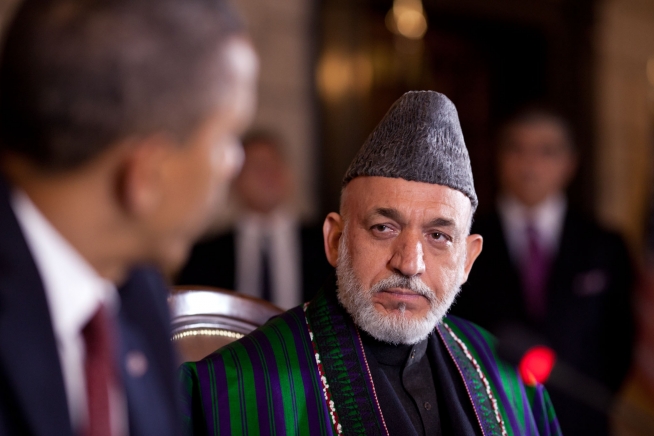A ceremony was held in Afghanistan on Monday to mark the official handover of the Bagram prison from American control to Afghan control, and while Afghan President Hamid Karzai welcomed the event, the US has quarreled over the transfer amid worries that Kabul might provide some measure of due process to inmates.
 Back in March, the US gave in to demands from Afghan President Hamid Karzai to give full control of the 3,000 inmates in Bagram detention center to the Afghan government as part of the transition to withdraw most US troops from the country in 2014.
Back in March, the US gave in to demands from Afghan President Hamid Karzai to give full control of the 3,000 inmates in Bagram detention center to the Afghan government as part of the transition to withdraw most US troops from the country in 2014.
Many of the detainess kept there by the US have not been charged or tried, and many have been severely abused. Early this year, an Afghan investigative commission accused the American military of abusing detainees in the Bagram prison facilities, prompting Karzai’s push on the issue. Attorney for Human Rights First Daphne Eviatar said in a recent CBS interview of Bagram that “It’s worse than Guantanamo, because there are fewer rights.”
Karzai applauded the handover, calling it a “very big step regarding the sovereignty of Afghanistan.” But despite the formal handover, the US is forcefully continuing to retain control over several dozen prisoners in a dispute with the Afghan government.
The disagreement over the transfer arose when US officials realized Kabul might refuse to adopt the no-trial detention system demanded by the US government.
“Now, the Bagram prison is converted to one of Afghanistan’s regular prisons where the innocents will be freed and the rest of the prisoners will be sentenced according to the laws of Afghanistan,” Karzai said. But the US doesn’t plan on letting that happen.
“Contrary to the Obama administration’s stated goals of increasing Afghan sovereignty and strengthening the rule of law in Afghanistan,” said Tina M. Foster, Executive Director of the International Justice Network, “this aspect of the transition will leave a dangerous legacy of unchecked and limitless power in the hands of whoever takes control of the country long after coalition forces have withdrawn.”
“The power to detain perceived enemies of the state indefinitely and without trial will not only lead to more arbitrary arrests and human rights abuses,” Foster added, “but will continue to fuel the insurgency for years to come – it is a great victory for the Taliban and a great loss for the Afghan people.”


